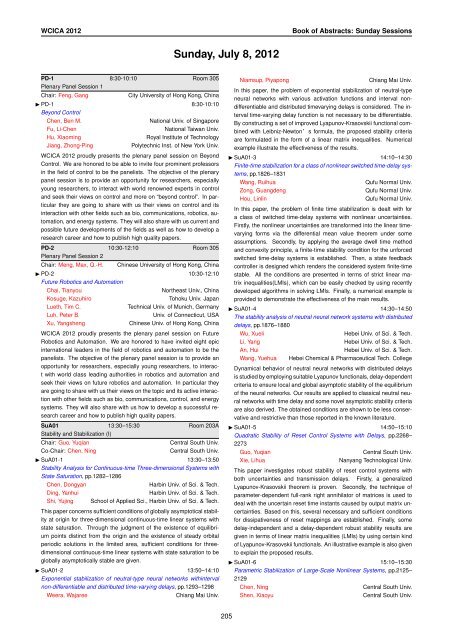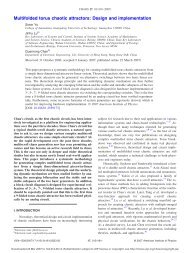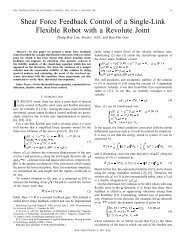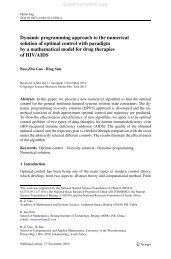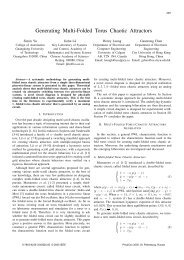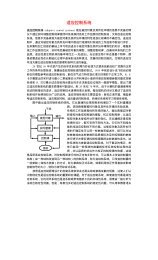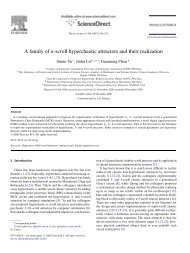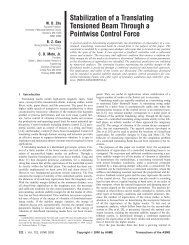Conference Program of WCICA 2012
Conference Program of WCICA 2012
Conference Program of WCICA 2012
You also want an ePaper? Increase the reach of your titles
YUMPU automatically turns print PDFs into web optimized ePapers that Google loves.
<strong>WCICA</strong> <strong>2012</strong><br />
Book <strong>of</strong> Abstracts: Sunday Sessions<br />
Sunday, July 8, <strong>2012</strong><br />
PD-1 8:30-10:10 Room 305<br />
Plenary Panel Session 1<br />
Chair: Feng, Gang<br />
City University <strong>of</strong> Hong Kong, China<br />
◮ PD-1 8:30-10:10<br />
Beyond Control<br />
Chen, Ben M.<br />
Fu, Li-Chen<br />
Hu, Xiaoming<br />
Jiang, Zhong-Ping<br />
National Univ. <strong>of</strong> Singapore<br />
National Taiwan Univ.<br />
Royal Institute <strong>of</strong> Technology<br />
Polytechnic Inst. <strong>of</strong> New York Univ.<br />
<strong>WCICA</strong> <strong>2012</strong> proudly presents the plenary panel session on Beyond<br />
Control. We are honored to be able to invite four prominent pr<strong>of</strong>essors<br />
in the field <strong>of</strong> control to be the panelists. The objective <strong>of</strong> the plenary<br />
panel session is to provide an opportunity for researchers, especially<br />
young researchers, to interact with world renowned experts in control<br />
and seek their views on control and more on “beyond control”. In particular<br />
they are going to share with us their views on control and its<br />
interaction with other fields such as bio, communications, robotics, automation,<br />
and energy systems. They will also share with us current and<br />
possible future developments <strong>of</strong> the fields as well as how to develop a<br />
research career and how to publish high quality papers.<br />
PD-2 10:30-12:10 Room 305<br />
Plenary Panel Session 2<br />
Chair: Meng, Max, Q.-H.<br />
Chinese University <strong>of</strong> Hong Kong, China<br />
◮ PD-2 10:30-12:10<br />
Future Robotics and Automation<br />
Chai, Tianyou<br />
Kosuge, Kazuhiro<br />
Lueth, Tim C.<br />
Luh, Peter B.<br />
Xu, Yangsheng<br />
Northeast Univ., China<br />
Tohoku Univ. Japan<br />
Technical Univ. <strong>of</strong> Munich, Germany<br />
Univ. <strong>of</strong> Connecticut, USA<br />
Chinese Univ. <strong>of</strong> Hong Kong, China<br />
<strong>WCICA</strong> <strong>2012</strong> proudly presents the plenary panel session on Future<br />
Robotics and Automation. We are honored to have invited eight epic<br />
international leaders in the field <strong>of</strong> robotics and automation to be the<br />
panelists. The objective <strong>of</strong> the plenary panel session is to provide an<br />
opportunity for researchers, especially young researchers, to interact<br />
with world class leading authorities in robotics and automation and<br />
seek their views on future robotics and automation. In particular they<br />
are going to share with us their views on the topic and its active interaction<br />
with other fields such as bio, communications, control, and energy<br />
systems. They will also share with us how to develop a successful research<br />
career and how to publish high quality papers.<br />
SuA01 13:30–15:30 Room 203A<br />
Stability and Stabilization (I)<br />
Chair: Guo, Yuqian<br />
Co-Chair: Chen, Ning<br />
Central South Univ.<br />
Central South Univ.<br />
◮ SuA01-1 13:30–13:50<br />
Stability Analysis for Continuous-time Three-dimensional Systems with<br />
State Saturation, pp.1282–1286<br />
Chen, Dongyan<br />
Ding, Yanhui<br />
Shi, Yujing<br />
Harbin Univ. <strong>of</strong> Sci. & Tech.<br />
Harbin Univ. <strong>of</strong> Sci. & Tech.<br />
School <strong>of</strong> Applied Sci., Harbin Univ. <strong>of</strong> Sci. & Tech.<br />
This paper concerns sufficient conditions <strong>of</strong> globally asymptotical stability<br />
at origin for three-dimensional continuous-time linear systems with<br />
state saturation. Through the judgment <strong>of</strong> the existence <strong>of</strong> equilibrium<br />
points distinct from the origin and the existence <strong>of</strong> steady orbital<br />
periodic solutions in the limited area, sufficient conditions for threedimensional<br />
continuous-time linear systems with state saturation to be<br />
globally asymptotically stable are given.<br />
◮ SuA01-2 13:50–14:10<br />
Exponential stabilization <strong>of</strong> neutral-type neural networks withinterval<br />
non-differentiable and distributed time-varying delays, pp.1293–1298<br />
Weera, Wajaree<br />
Chiang Mai Univ.<br />
Niamsup, Piyapong<br />
Chiang Mai Univ.<br />
In this paper, the problem <strong>of</strong> exponential stabilization <strong>of</strong> neutral-type<br />
neural networks with various activation functions and interval nondifferentiable<br />
and distributed timevarying delays is considered. The interval<br />
time-varying delay function is not necessary to be differentiable.<br />
By constructing a set <strong>of</strong> improved Lyapunov-Krasovskii functional combined<br />
with Leibniz-Newton’s formula, the proposed stability criteria<br />
are formulated in the form <strong>of</strong> a linear matrix inequalities. Numerical<br />
example illustrate the effectiveness <strong>of</strong> the results.<br />
◮ SuA01-3 14:10–14:30<br />
Finite-time stabilization for a class <strong>of</strong> nonlinear switched time-delay systems,<br />
pp.1826–1831<br />
Wang, Ruihua<br />
Zong, Guangdeng<br />
Hou, Linlin<br />
Qufu Normal Univ.<br />
Qufu Normal Univ.<br />
Qufu Normal Univ.<br />
In this paper, the problem <strong>of</strong> finite time stabilization is dealt with for<br />
a class <strong>of</strong> switched time-delay systems with nonlinear uncertainties.<br />
Firstly, the nonlinear uncertainties are transformed into the linear timevarying<br />
forms via the differential mean value theorem under some<br />
assumptions. Secondly, by applying the average dwell time method<br />
and convexity principle, a finite-time stability condition for the unforced<br />
switched time-delay systems is established. Then, a state feedback<br />
controller is designed which renders the considered system finite-time<br />
stable. All the conditions are presented in terms <strong>of</strong> strict linear matrix<br />
inequalities(LMIs), which can be easily checked by using recently<br />
developed algorithms in solving LMIs. Finally, a numerical example is<br />
provided to demonstrate the effectiveness <strong>of</strong> the main results.<br />
◮ SuA01-4 14:30–14:50<br />
The stability analysis <strong>of</strong> neutral neural network systems with distributed<br />
delays, pp.1876–1880<br />
Wu, Xueli<br />
Li, Yang<br />
An, Hui<br />
Wang, Yuehua<br />
Hebei Univ. <strong>of</strong> Sci. & Tech.<br />
Hebei Univ. <strong>of</strong> Sci. & Tech.<br />
Hebei Univ. <strong>of</strong> Sci. & Tech.<br />
Hebei Chemical & Pharmaceutical Tech. College<br />
Dynamical behavior <strong>of</strong> neutral neural networks with distributed delays<br />
is studied by employing suitable Lyapunov functionals, delay-dependent<br />
criteria to ensure local and global asymptotic stability <strong>of</strong> the equilibrium<br />
<strong>of</strong> the neural networks. Our results are applied to classical neutral neural<br />
networks with time delay and some novel asymptotic stability criteria<br />
are also derived. The obtained conditions are shown to be less conservative<br />
and restrictive than those reported in the known literature.<br />
◮ SuA01-5 14:50–15:10<br />
Quadratic Stability <strong>of</strong> Reset Control Systems with Delays, pp.2268–<br />
2273<br />
Guo, Yuqian<br />
Xie, Lihua<br />
Central South Univ.<br />
Nanyang Technological Univ.<br />
This paper investigates robust stability <strong>of</strong> reset control systems with<br />
both uncertainties and transmission delays. Firstly, a generalized<br />
Lyapunov-Krasovskii theorem is proven. Secondly, the technique <strong>of</strong><br />
parameter-dependent full-rank right annihilator <strong>of</strong> matrices is used to<br />
deal with the uncertain reset time instants caused by output matrix uncertainties.<br />
Based on this, several necessary and sufficient conditions<br />
for dissipativeness <strong>of</strong> reset mappings are established. Finally, some<br />
delay-independent and a delay-dependent robust stability results are<br />
given in terms <strong>of</strong> linear matrix inequalities (LMIs) by using certain kind<br />
<strong>of</strong> Lyapunov-Krasovskii functionals. An illustrative example is also given<br />
to explain the proposed results.<br />
◮ SuA01-6 15:10–15:30<br />
Parametric Stabilization <strong>of</strong> Large-Scale Nonlinear Systems, pp.2125–<br />
2129<br />
Chen, Ning<br />
Shen, Xiaoyu<br />
Central South Univ.<br />
Central South Univ.<br />
205


